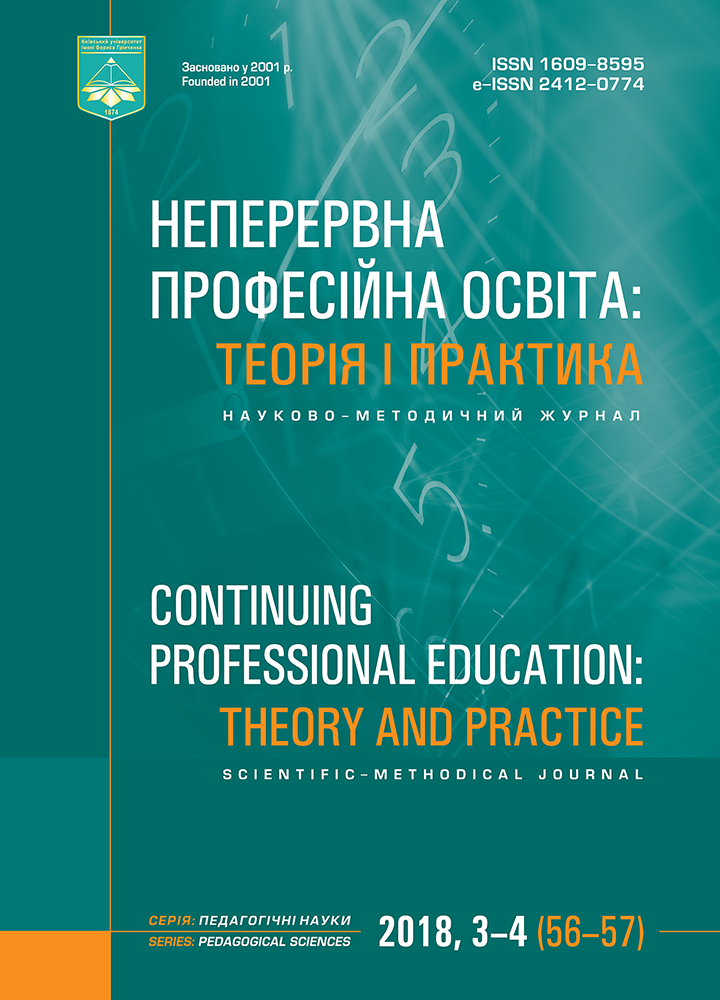MODEL OF PEDAGOGICAL EDUCATION OF THE MODERN UNIVERSITY
DOI:
https://doi.org/10.28925/1609-8595.2018.3-4.713Keywords:
adaptive management, educational-scientific complex, model, pedagogical education, stages of continuous pedagogical education, variational forms.Abstract
The article actualizes the problem of pedagogical education in accordance with the new conceptual principles of its development; there is an attempt to describe a model of educational and scientific complex for higher pedagogical education on the example of the Borys Grinchenko Kyiv University. The activity of the complex corresponds to the principles of integrity, continuity, regularity, openness, variability of professional training forms. Management of such a complex has an adaptive character and is determined by the purposefulness, consistency, resource availability, the interaction of control and controlled subsystems. The authors identify varieties of continuous pedagogical education; characterize the main organizational features of training specialists at different stages of pedagogical education, taking into account its varieties; varied forms of continuous pedagogical education are distinguished at the appropriate stages (pre-professional, adaptive-professional, system-professional, acme-professional). Each of the stages has its own content, which corresponds to modern educational trends: the introduction of competence, person-oriented, and activity approaches; development of innovative thinking and leadership potential; creating conditions for inclusive education, etc. This way provides favorable conditions for the professional-personal formation of a pedagogue at all stages of this process: from the defining of professional intentions to improving pedagogical skills. The article focuses on the advantages of introducing the proposed model, which are seen in the diversification of pedagogical training, expanding the competence field of pedagogical knowledge and skills usage; in creating a dynamic educational environment, and in motivating higher education graduates to self-organization in the process of building their own professional development trajectory.References
Zakon Ukrainy «Pro osvitu» [Law of Ukraine «On Education»] (2017). Retrieved from http://osvita.ua/legislation/law/2231/ (ukr).
Yelnykova, H. V. (Ed.) (2009). Adaptyvne upravlinnia: sutnist, kharakterystyky, monitorynhovi systemy [Adaptive management: essence, characteristics, monitoring systems]. Chernivtsi, Ukraine: Tekhnodruk (ukr).
Kohut, S. (2014). Profesiina pedahohichna osvita u doslidzhenniakh vchenykh Ukrainy [Professional pedagogical education in researches of Ukrainian scientists]. Visnyk Cherkaskoho universytetu: Seriia: Pedahohichni nauky, 30 (323), 81–86 (ukr).
Kremen, V. (2011). Postup do novoi filosofii osvity v Ukraini [Progress in a new philosophy of education in Ukraine]. In Rozvytok pedahohichnykh nauk v Ukraini i Polshchi na pochatku XXI stolittia: zbirnyk naukovykh prats, (pp. 11–21). Cherkasy, Ukraine: Vydavets Chabanenko Yu. A. (ukr).
Krystopchuk, T. I. (2013). Pedahohichna osvita v krainakh Yevropeiskoho Soiuzu: monohrafiia [Pedagogical education in the countries of the European Union: monohraf]. Rivne, Ukraine: Volynski oberehy (ukr).
Lokshyna, O. I. (2018). Vidkryta osvita v Yevropeiskomu prostori: stratehiia rozbudovy [Open education in the European: strategy of development]. Pedahohichni nauky: teoriia, istoriia, innovatsiini tekhnolohii, 2 (76), 75–86. DOI: 10.24139/2312-5993/2018.02/075-086 (ukr).
Nychkalo, N. H. (2013). Profesiina pedahohika i psykhopedahohika pratsi u dialektychnomu vzaiemozviazku [Professional pedagogy and psycho-pedagogy of labor in a dialectical relationship]. Problemy ta tendentsii rozvytku pedahohichnoi osvity, 2, 42–53 (ukr).
Onyshchenko, V. D. (2014). Fundamentalni pedahohichni teorii: monohrafiia [Fundamental pedagogical theories: monohraf]. Lviv Ukraine: Norma (ukr).
Pro zatverdzhennia kontseptsii pedahohichnoi osvity. Nakaz Ministerstva osvity i nauky №776 vid 16 lypnia 2018 r. [On approval of the concept of pedagogical education. Order of the Ministry of Education and Science No. 776 dated July 16, 2018]. Retrieved from https://mon.gov.ua/ua/npa/pro-zatverdzhennya-koncepciyi-rozvitku-pedagogichnoyi-osviti (ukr).
Pukhovska, L. P. (2013). Standarty pedahohichnoi osvity: naukova dyskusiia zakhidnykh uchenykh [Standards of pedagogical education: scientific discussion of Western scholars]. Tavriiskyi visnyk osvity, 4 (44), 10–18 (ukr).
Tretiakov, P. Y., Mytyn, S. N., Boiaryntseva, N. N. (2003). Adaptyvnoe upravlenye pedahohycheskymy systemamy [Adaptive management of pedagogical systems].Moscow,Russia: Tsentr «Akademyia» (rus).
Downloads
How to Cite
Issue
Section
License
Copyright (c) 2020 Liudmyla Khoruzha, Maria Bratco

This work is licensed under a Creative Commons Attribution-NonCommercial 3.0 Unported License.



